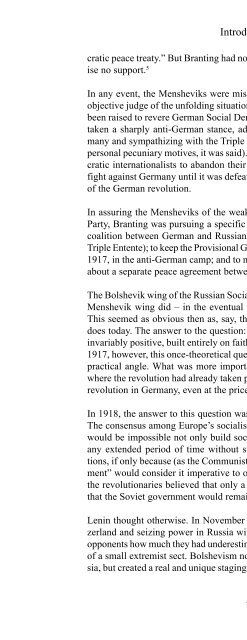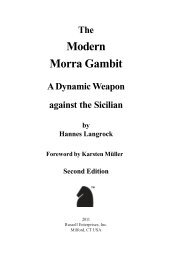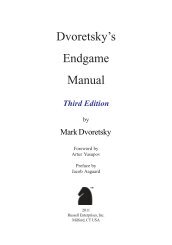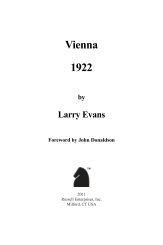Lenin, Trotsky, Germany and the Treaty of Brest-Litovsk The ...
Lenin, Trotsky, Germany and the Treaty of Brest-Litovsk The ...
Lenin, Trotsky, Germany and the Treaty of Brest-Litovsk The ...
You also want an ePaper? Increase the reach of your titles
YUMPU automatically turns print PDFs into web optimized ePapers that Google loves.
<strong>Lenin</strong>, <strong>Trotsky</strong>, <strong>Germany</strong> <strong>and</strong> <strong>the</strong> <strong>Treaty</strong> <strong>of</strong> <strong>Brest</strong>-<strong>Litovsk</strong>During <strong>the</strong>se days, <strong>Lenin</strong> was effectively marginalized. All <strong>of</strong> <strong>the</strong> key decisionspertaining to <strong>the</strong> revolution in <strong>Germany</strong> were made by <strong>the</strong> Central Committee <strong>of</strong><strong>the</strong> Bolshevik Party without him. Even <strong>the</strong> decree terminating <strong>the</strong> <strong>Treaty</strong> <strong>of</strong> <strong>Brest</strong>-<strong>Litovsk</strong> was published as a decree <strong>of</strong> <strong>the</strong> Soviet parliament – <strong>the</strong> All-RussianCentral Executive Committee (VTsIK), signed by Yakov Sverdlov – <strong>and</strong> not as adecision <strong>of</strong> <strong>the</strong> government – <strong>the</strong> Soviet <strong>of</strong> People’s Commissars (Sovnarkom),which was headed by <strong>Lenin</strong>. <strong>The</strong> revolution in <strong>Germany</strong> was still only beginning,while <strong>Lenin</strong> was already losing his power. With Rosa Luxemburg <strong>and</strong> <strong>Trotsky</strong> incharge <strong>of</strong> <strong>the</strong> <strong>the</strong>oretical side <strong>of</strong> things, <strong>and</strong> with Liebknecht <strong>and</strong> Sverdlov incharge <strong>of</strong> <strong>the</strong> practical side, <strong>Lenin</strong> was ceasing to be irreplaceable. Possibly, itwas precisely for this reason that he never took <strong>the</strong> risk <strong>of</strong> convening <strong>the</strong> Cominternwhile Liebknecht <strong>and</strong> Luxemburg were still alive. Only in March 1919, two monthsafter <strong>the</strong> leaders <strong>of</strong> <strong>the</strong> German Communist Party <strong>and</strong> <strong>Lenin</strong>’s rivals for leadershipin <strong>the</strong> International were murdered, <strong>and</strong> immediately following <strong>the</strong> mysteriousdeath <strong>of</strong> Sverdlov – <strong>Lenin</strong>’s rival for leadership in <strong>the</strong> Bolshevik Party in Russia– did <strong>Lenin</strong> convene <strong>the</strong> first Comintern congress, initiating <strong>the</strong> practice <strong>of</strong> breakingup Western Communist parties <strong>and</strong> h<strong>and</strong>picking delegates to suit Soviet ends. Ashead <strong>of</strong> <strong>the</strong> Communist International, he appointed <strong>the</strong> Bolshevik GrigoryZinoviev, who had not written a single <strong>the</strong>oretical article, but who was a skillfulparty operator. And since <strong>the</strong> German revolution had suffered an obvious defeat,Soviet Russia became <strong>of</strong>ficially <strong>and</strong> definitively established as center <strong>of</strong> <strong>the</strong> worldCommunist movement; <strong>and</strong> even those who refused to concede to it a position <strong>of</strong>ideological leadership were forced all <strong>the</strong> time to contend with it.* * *<strong>The</strong> German problem was <strong>the</strong> most important problem confronting <strong>the</strong> Russianrevolutionaries, but not <strong>the</strong> only one. <strong>The</strong> Soviet state <strong>and</strong> <strong>Lenin</strong>’s governmentalso had internal enemies. In November 1917, <strong>Lenin</strong> had to defend <strong>the</strong> BolshevikParty’s right to form <strong>the</strong> Soviet <strong>of</strong> People’s Commissars, <strong>and</strong> he had to hold ontopower in a st<strong>and</strong><strong>of</strong>f with a bloc <strong>of</strong> socialist parties that fought for <strong>the</strong> formation <strong>of</strong>a multiparty “homogeneous socialist government.” In this conflict, <strong>Lenin</strong> cameout victorious thanks to <strong>the</strong> fact that, at <strong>the</strong> crucial moment, he was supported, on<strong>the</strong> one h<strong>and</strong>, by <strong>Trotsky</strong>, <strong>and</strong> on <strong>the</strong> o<strong>the</strong>r h<strong>and</strong>, by <strong>the</strong> Left SR Party, politicalcollaboration with which became <strong>the</strong> dominant factor <strong>of</strong> party politics during <strong>the</strong>first half <strong>of</strong> 1918.In November 1917, anarchy reigned in Russia. <strong>The</strong> Provisional Government, whichhardly controlled <strong>the</strong> course <strong>of</strong> events even during <strong>the</strong> best moments <strong>of</strong> its existence,ceased to be a political force. In this vacuum, <strong>the</strong> Bolshevik coup was more<strong>of</strong> a paper declaration than a factual takeover <strong>of</strong> <strong>the</strong> country’s government by <strong>the</strong>Bolsheviks. No one understood this better than <strong>the</strong> leaders <strong>of</strong> Russia’s politicalparties. Naturally, <strong>the</strong> replacement <strong>of</strong> <strong>the</strong> unreal Provisional Government with anequally unreal Bolshevik government had little effect on <strong>the</strong> general chaos inwhich Russia was submerged.12








